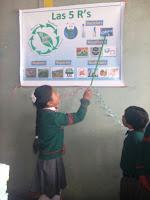One nice thing that Peace Corps does for its volunteers is supporting what are called technical exchanges. It’s a way for us to share our knowledge, experience, and expertise with other volunteers while Peace Corps pays for our travel. It’s also a great way to see the country without using vacation days, a motive which I’m sure is not lost on Peace Corps. I did my first tech exchange last week, and am calling this entry “Exchanging Tech, Part 1” because even though I don’t have any other tech exchanges planned at the moment, I have a feeling there will be more in the future. So stay tuned for Parts 2, 3, 4, and hopefully more!
 |
| Some of the fantastic scenery in Chimborazo province! |
So for my first tech exchange, I went to visit a fellow NRC volunteer, Jhonny, in Riobamba (Chimborazo Province). Jhonny works with a non-profit group that does a number of things from water monitoring and waste management, environmental education, and after-school eco-clubs in several communities around Riobamba, which is located in the Sierra- basically in the middle of the country- and only 8 hours away by bus! While I was there, I attended an eco-fair at a school in a rural community nearby, discussed logistics of running an eco-club with an Ecuadorian who runs several successful brigadas in the area, and attended a talk that Jhonny gave for university students about the current state of water and other envrionmental issues in the province.
 |
| Water conservation according to 1st graders |
At the school fair, we attended different sessions put on by kids of all grades about topics like water conservation, recycling, nutrition, waste management, and even got to sample some veggies from their organic school garden. The kids were adorable, even if you couldn't hear or understand anything they were saying. For the most part, they had clearly memorized lines to recite in front of their teachers and peers. This is an unfortunately common but not-so-surprising reality in the Ecua-education system: rote memorization above real comprehension. They were cute and informative nonetheless!
| Cooking with veggies from the garden! |
I got to see a very successful environmental education program in a rural community, and got some great ideas of things to do with the kids up here in Esmeraldas, although we do not have the funding that Jhonny's organization provides to these programs. I know that will still be a major challenge, as well as getting kids interested enough to show up to activities and meetings. But as they say here, poco a poco.
The next day I watched Jhonny give his talk, then we explored the town of Guano nearby and hiked to the top of town for an amazing view of the valley below and the mountains/volcanoes beyond.
| View from above Guano |
 |
| Hikin' |
That marked the end of real tech exchanging, but the following day we were able to squeeze in a hike up in the nearby cloud forest. Everything was so green, the air was clean, and there were gorgeous waterfalls all around. Despite the fact that I am no longer acclimated to living at high altitude, my lungs survived the day! As did my feet- I had left any decent hiking shoes at home and had to wear Jhonny's running shoes for the hike. A little tough on the downhill, but it was worth it!
| One of many gorgeous waterfalls |
And of course, I took advantage of being in a real city! I dragged Jhonny around so that I could eat pizza, pasta, and a cheeseburger- we went to a Chili's and ordered off of American menus! A real treat for us both.. and there was no rice to be found! I also went to a yoga class, took advantage of Jhonny's oven by whipping up some banana bread (rather, watching while he whipped it up), and used hisWiFi to check my email multiple days IN A ROW and also skype with fellow volunteers around the country. Needless to say, it was hard to leave the modern world and head back out to the campo, but in a way I also missed my cement house and my toldo and knowing everyone I pass on the street (literally, Galera has one paved road..) And of course I missed the warm weather! When I returned to my site, I got off the bus and a bunch of kids playing soccer out on the cancha starting yelling "Daniela! ¿Dónde estaba?" and asked me if I would be back up at the school on Monday. I love my site, and I'm happy to be back, but it's also good to know that my friends (and civilization) will be there when I need it! Now... to find someone to "exchange tech" with out in the Amazon...





